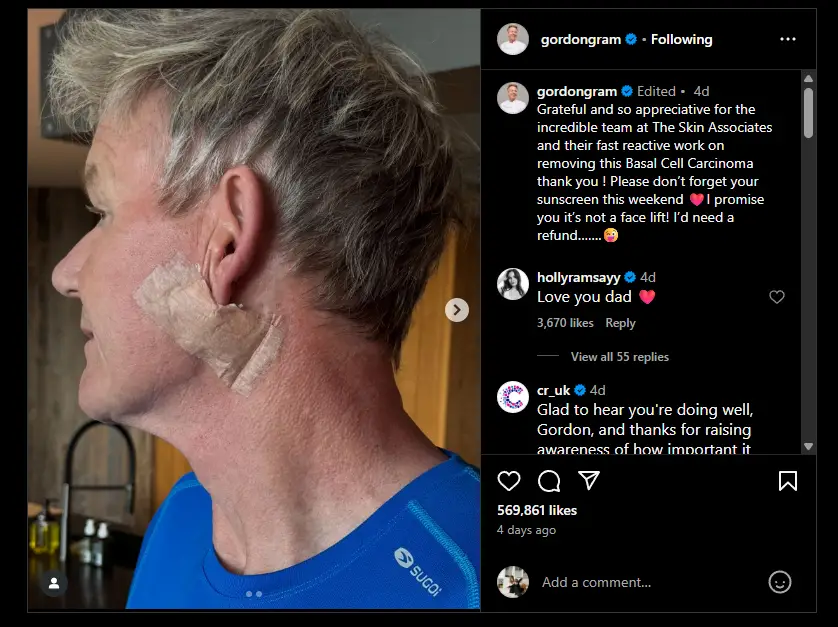Gordon Ramsay Reveals Skin Cancer Diagnosis and Urges Fans to Stay Protected in the Sun
Celebrity chef Gordon Ramsay has always been known for his fiery personality in the kitchen, but this time, he is making headlines for a far more personal reason. The 58-year-old star recently revealed that he was diagnosed with basal cell carcinoma (BCC) — a common form of skin cancer — and used the moment to raise awareness about the importance of sun safety.
Opening Up About His Diagnosis
On Saturday, August 30, Ramsay took to Instagram to share the news with his millions of followers. In a candid post, he explained that earlier in the year, he had undergone surgery to remove a basal cell carcinoma located just under his ear.
He expressed his gratitude to the medical team that treated him, writing:
“Grateful and so appreciative for the incredible team at The Skin Associates and their fast reactive work on removing this Basal Cell Carcinoma. Thank you! Please don’t forget your sunscreen this weekend.”
In true Gordon Ramsay fashion, he lightened the mood with humor, joking:
“I promise you it’s not a facelift! I’d need a refund.”
His heartfelt and humorous message quickly went viral, receiving more than 500,000 likes and thousands of comments from fans, celebrities, and organizations.

Support From Fans and Family
The reaction was immediate. Ramsay’s followers filled the comments section with messages of encouragement and love.
One wrote: “Heal quickly, Chef, and thank you for bringing awareness to all of us.”
Another shared: “I just lost my mom to cancer. I pray you can stay safe and healthy.”
His daughter Holly Ramsay also commented, simply posting: “Love you, Dad.”
Even Cancer Research UK left a public note under his post, praising Ramsay for using his platform to educate others:
“Glad to hear you’re doing well, Gordon, and thanks for raising awareness of how important it is to stay safe in the sun. Seek shade, cover up, and apply sunscreen regularly and generously.”
What Is Basal Cell Carcinoma (BCC)?
Basal cell carcinoma is the most common type of non-melanoma skin cancer. According to the NHS, it begins in the basal cells, which are found in the top layer of the skin (the epidermis).
Unlike melanoma — the more aggressive form of skin cancer — BCC grows slowly and rarely spreads to other parts of the body. However, if left untreated, it can damage nearby tissue, including skin, muscle, and bone.
Main Risk Factors:
-
Sun exposure (UV light): Spending long hours outdoors without sun protection is the primary cause.
-
Fair or pale skin: Individuals with lighter complexions are more susceptible.
-
Age: Older adults are at higher risk, though it can affect younger people too.
-
History of skin cancer: Having had skin cancer before increases future risk.
Symptoms Can Include:
-
A growth or lump on the skin, often pearly or shiny.
-
A sore that does not heal, or heals and then returns.
-
Red patches or irritated areas on sun-exposed skin.
-
Spots that bleed or form a scab repeatedly.
Most commonly, BCC appears on areas of the body that receive the most sunlight, such as the face, neck, scalp, and hands.
Gordon Ramsay’s Message: Take Sun Safety Seriously
In his Instagram post, Ramsay urged his fans not to ignore the importance of sunscreen and protective habits. His warning echoes advice from dermatologists worldwide:
-
Always wear broad-spectrum sunscreen (SPF 30 or higher).
-
Reapply every two hours when outdoors, especially if swimming or sweating.
-
Wear hats, sunglasses, and protective clothing.
-
Avoid tanning beds.
-
Regularly check your skin for unusual growths or sores.
For Ramsay, the diagnosis was a wake-up call — and he hopes it serves as one for others, too.
How Is Basal Cell Carcinoma Treated?
The good news is that BCC is highly treatable when caught early. Ramsay’s successful surgery highlights how effective early medical intervention can be.
Here are the main treatment methods:
1. Surgical Removal
-
The most common treatment is simply cutting out the cancerous tissue.
-
In some cases, Mohs surgery is used — a highly precise procedure where layers of skin are removed and examined under a microscope until no cancer cells remain.
-
This method is especially effective for facial BCCs, where preserving as much healthy tissue as possible is important.
2. Cryotherapy
-
The cancer cells are destroyed using liquid nitrogen to freeze them.
-
This is typically used for smaller, superficial cancers.
3. Topical Treatments
-
Prescription creams such as imiquimod or 5-fluorouracil may be applied to stimulate the immune system to destroy cancer cells.
4. Radiation Therapy
-
For patients unable to undergo surgery, radiation may be recommended.
-
It uses targeted beams to destroy cancer cells without removing skin.
5. Targeted Therapy or Photodynamic Therapy (PDT)
-
In rare or complex cases, advanced treatments like light-activated drugs can be used to kill cancer cells.
Can Basal Cell Carcinoma Be Cured?
Yes — the majority of BCC cases can be completely cured. According to the American Cancer Society, cure rates are extremely high when treatment begins early.
-
Surgical removal has a cure rate of up to 95–99%.
-
Most patients go on to live normal, healthy lives after treatment.
However, recurrence is possible, especially for people who continue to get high sun exposure. This is why ongoing skin checks are vital.
Prevention: Protecting Yourself From Skin Cancer
Gordon Ramsay’s story serves as a reminder that prevention is just as important as treatment. Experts recommend:
-
Use sunscreen daily – even on cloudy days.
-
Avoid peak sun hours (10 a.m. – 4 p.m.).
-
Wear protective clothing, including wide-brimmed hats.
-
Check your skin monthly for new or changing spots.
-
See a dermatologist yearly for a professional skin exam.
By making these small changes, you can significantly lower your risk of developing skin cancer.
Final Thoughts
Gordon Ramsay’s revelation about his skin cancer diagnosis was not only brave but also incredibly important. By speaking openly about his experience, he reminded millions of people that skin cancer is real, common, and preventable when caught early.
While basal cell carcinoma is rarely life-threatening, ignoring symptoms can lead to more severe outcomes. Ramsay’s story highlights the importance of vigilance, medical checkups, and everyday prevention like sunscreen and shade.
As fans wish him a full recovery, his message lingers: protect your skin today, so you don’t face bigger battles tomorrow.

Ethan Blake is a skilled Creative Content Specialist with a talent for crafting engaging and thought-provoking narratives. With a strong background in storytelling and digital content creation, Ethan brings a unique perspective to his role at TheArchivists, where he curates and produces captivating content for a global audience.
Ethan holds a degree in Communications from Zurich University, where he developed his expertise in storytelling, media strategy, and audience engagement. Known for his ability to blend creativity with analytical precision, he excels at creating content that not only entertains but also connects deeply with readers.
At TheArchivists, Ethan specializes in uncovering compelling stories that reflect a wide range of human experiences. His work is celebrated for its authenticity, creativity, and ability to spark meaningful conversations, earning him recognition among peers and readers alike.
Passionate about the art of storytelling, Ethan enjoys exploring themes of culture, history, and personal growth, aiming to inspire and inform with every piece he creates. Dedicated to making a lasting impact, Ethan continues to push boundaries in the ever-evolving world of digital content.
